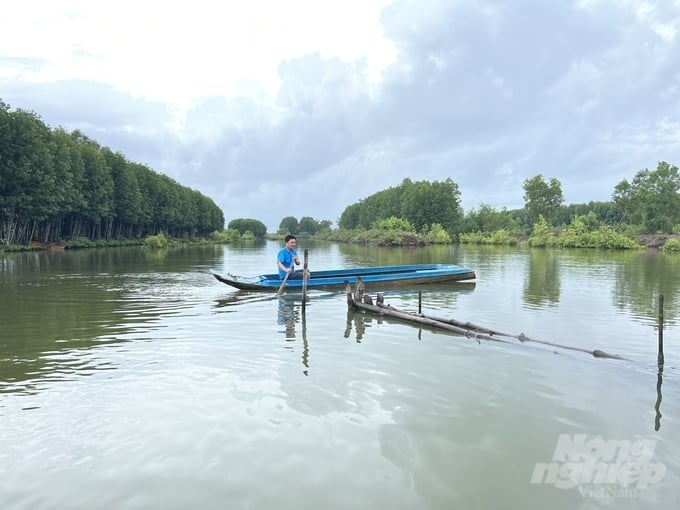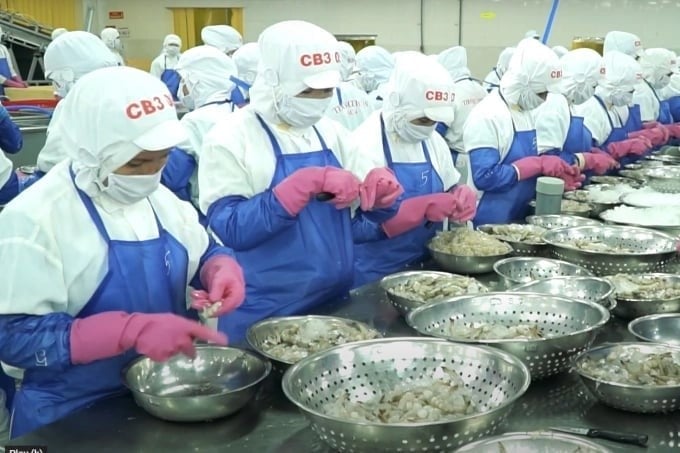November 23, 2025 | 04:24 GMT +7
November 23, 2025 | 04:24 GMT +7
Hotline: 0913.378.918
November 23, 2025 | 04:24 GMT +7
Hotline: 0913.378.918

Sustainable production standards are considered a hinge for improving the quality of raw material areas, meeting market needs, and increasing product value. Photo: Trong Linh.
Currently, many businesses operating in the agriculture sector in Ca Mau Province are small and medium-sized. When participating in the value chain, businesses face many challenges, especially meeting high standards for society, the environment, and sustainable production. This leads to the fact that linking with farmers to purchase stable products of high quality according to international standards still faces difficulties and challenges.
The GRAISEA project, part of the program “Gender Transformative and Responsible Agribusiness Investments in Southeast Asia”, creates transformational opportunities for small production households in the agriculture sector in Asia by promoting inclusive value chains, doing responsible business, respecting human rights, increasing economic empowerment for women, and adapting to climate change. Ca Mau Province is one of the localities that benefit from this project.

Shrimp-ecological forest model in Ngoc Hien district, Ca Mau province. Photo: Trong Linh.
The Ministry of Agriculture and Rural Development has also approved the pilot project to build a standard agro-forestry-fishery raw material area for domestic consumption and export in the 2022–2025 period. Of which, the raw material area is determined as the starting point and the foundation for developing agro-forestry-fishery value chains effectively and sustainably. Sustainable production standards are considered a hinge for improving the quality of raw material areas, meeting market needs, and increasing product value.
The GRAISEA project has created conditions and opportunities to promote sustainable production standards such as GAP/VietGAP, organic certification, SRP on rice, ASC, etc. for Ca Mau province, contributing to improving the quality of raw material areas, meeting the needs of domestic and international markets, and increasing product value.
Mr. Le Van Su, Vice Chairman of the Ca Mau Provincial People's Committee, assessed: The GRAISEA project has made an important contribution to supporting localities in the province to promote sustainable production standards, typically the ASC standard in the shrimp-rice chain. In 2022, Tri Luc commune, Thoi Binh district (Ca Mau), became the first shrimp farming area on rice land to achieve ASC certification in Vietnam and also in the world. The model in Tri Luc commune is also supported and expanded by the Ca Mau Provincial People's Committee in the organic agriculture development plan for the 2020–2025 period.

The shrimp-rice model is certified ASC in Tri Luc commune, Thoi Binh district, Ca Mau province. Photo: Trong Linh.
Within the project’s framework, many initiatives to promote agricultural production that adapts to climate change and digitizes effective production, management, and trade platforms have been implemented. These initiatives aim to enhance exchange and linkages between parties in the shrimp-rice chains. These initiatives include a shrimp-rice production model adapting to climate change, the Rice Hero application on smartphones to measure emissions in rice production, a natural disaster risk prevention fund, a digital application for the Vietnam Shrimp Forum, an e-commerce channel for farmers, etc.
The GRAISEA project has supported improving the management and operational capacity of cooperatives in two rice-shrimp value chains in five Mekong Delta provinces, including An Giang, Soc Trang, Bac Lieu, Kien Giang, and Ca Mau. At the same time, support leading corporations and small and medium businesses to improve their business models and investment policies in an inclusive and responsible manner. The mutually beneficial relationship between small-scale producers and businesses can be seen specifically when farmers standardize farming processes and ensure the quality and output supplied for export processing. In particular, businesses stably purchase at preferential prices for farmers and, at the same time, have policies to support techniques and materials for farmers.

The GRAISEA project has made an important contribution to helping Ca Mau Province's seafood exports reach over USD 1 billion in three consecutive years. Photo: Trong Linh.
Ms. Van Ngoc Dieu, Deputy Director of Tri Luc Rice-Shrimp Production Service Cooperative and Head of the Women's Livelihood Group of Tri Luc Cooperative (Tri Luc commune, Thoi Binh district), said that the cooperative's shrimp-rice model with the ST24 rice variety has been fully purchased for rice production. Hereby, rural women could participate in the rice production line, creating more livelihoods and increasing family income.
After five years of implementation, the project has supported approximately 4,500 farmers (more than 55% are women) and 58 cooperatives to produce according to sustainable standards and increase income. More than 100 small and medium enterprises participating in the project have been supported to improve production and business efficiency. The project has also supported 15 leading enterprises in the sector (including Minh Phu Seafood Group JSC and Southern Shrimp JSC), contributing to improving policies and responsible business models, thereby helping more than 10,000 employees benefit from salary and social welfare policies. Nine initiatives to promote sustainable and comprehensive shrimp-rice value chains have been supported to establish and operate, including the Vietnam Sustainable and Clean Shrimp Alliance.
Translated by Huyen Vu Thu

(VAN) Results from the Sustainable Durian Model Project in Dak Lak have confirmed the critical role of Yara Viet Nam in transferring advanced nutritional solutions to farmers.

(VAN) In Tuyen Quang province, livestock farmers have introduced effective models and innovative practices that significantly strengthen African Swine Fever prevention and control efforts.

(VAN) This is the study conducted by IRRI and Can Tho University on the rice straw value chain in Mekong Delta showing an economic potential of more than 6.6 trillion VND/year.

(VAN) By participating in cooperative economics, many farmers in Tay Ninh have overcome hardship, mastered clean dragon fruit cultivation techniques.

(VAN) The crossbreeding program in the former Binh Dinh province (now part of Gia Lai) has shown signs of decline, and urgent measures are needed to revive it and sustain past achievements.

(VAN) The agricultural sector agreed on a roadmap to pilot the MRV protocol and expand low-emission rice production from the 2025-2026 winter-spring crop.

(VAN) Agricultural extension officers in Quang Ninh do more than transmit knowledge; they have become a steadfast support system for farmers on the path to sustainable agricultural development.